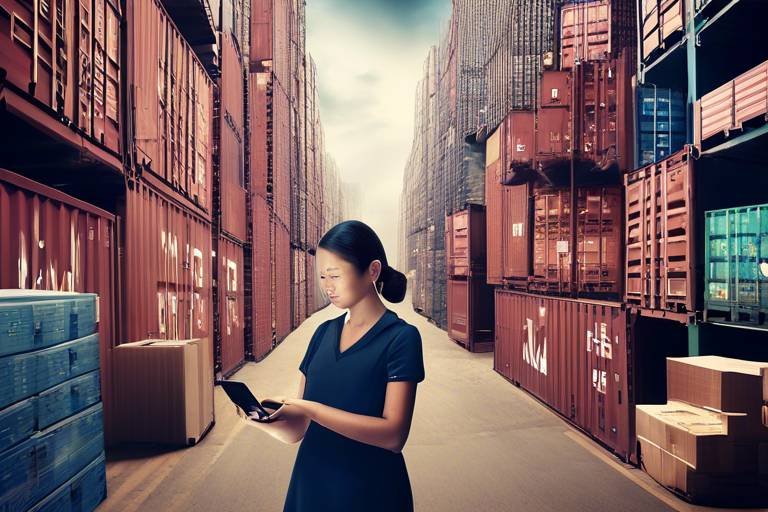How Technology is Impacting International Trade
The landscape of international trade is undergoing a remarkable transformation, largely fueled by rapid advancements in technology. In a world where borders are becoming increasingly blurred, technology is acting as the bridge that connects businesses and consumers across the globe. Imagine a marketplace that never closes, where products from every corner of the world are just a click away. This is the reality that technology has created, making international trade not only more accessible but also more efficient than ever before.
From the rise of e-commerce platforms to the implementation of cutting-edge supply chain solutions, technology is reshaping how businesses operate on a global scale. Gone are the days when small businesses had to rely solely on local markets; now, with a robust online presence, even the smallest entrepreneurs can tap into international demand. The ease of accessing global markets has led to a surge in cross-border transactions, creating new opportunities for growth and innovation.
However, this digital revolution is not without its challenges. As businesses embrace technology, they must also navigate the complexities of cybersecurity, regulatory compliance, and the ever-present digital divide. The balance between leveraging technological advancements and ensuring secure operations is a tightrope that many companies must walk. Yet, the potential benefits far outweigh the hurdles, as the future of international trade is set to be defined by continuous innovation and collaboration.
In this article, we will delve deeper into the various ways technology is impacting international trade, exploring the role of e-commerce, supply chain innovations, and the challenges that come with digital trade. We'll also take a look at the future of global commerce, where technology will undoubtedly play a pivotal role in shaping how we trade and interact on an international scale.
E-commerce platforms have revolutionized how businesses engage in international trade, enabling easier access to global markets and facilitating transactions across borders with enhanced efficiency and convenience. With just a few clicks, consumers can purchase products from thousands of miles away, and businesses can reach customers they never thought possible. This has led to a significant increase in the number of online sellers and buyers, creating a vibrant digital marketplace.
Moreover, e-commerce has lowered the barriers to entry for small and medium-sized enterprises (SMEs) looking to expand internationally. These businesses can now compete with larger corporations on a more level playing field, thanks to digital marketing tools and platforms that allow them to showcase their products to a global audience. As a result, the international trade landscape is becoming increasingly diverse, with a wider range of products and services available to consumers.
Technological advancements in supply chain management, such as automation and real-time tracking, have improved logistics, reduced costs, and enhanced transparency, ultimately benefiting international trade operations. With the help of technology, businesses can now monitor their supply chains in real-time, ensuring that products are delivered on time and in perfect condition. This level of visibility is crucial in a globalized market where delays can lead to significant financial losses.
One of the most exciting innovations in this space is blockchain technology. It offers secure and transparent transaction processes, which can significantly reduce fraud and enhance trust among international trading partners. Imagine a world where every transaction is recorded on an immutable ledger, making it virtually impossible for anyone to tamper with the data. This level of security is a game-changer for global commerce, allowing businesses to engage confidently with partners across different countries.
Another fascinating aspect of blockchain is the use of smart contracts. These are self-executing contracts with the terms of the agreement directly written into code. Smart contracts automate and enforce agreements between parties in international trade, reducing the need for intermediaries and streamlining the entire process, thus saving time and resources. Imagine a scenario where payments are automatically released once goods are delivered, eliminating the need for lengthy negotiations and paperwork.
With traceability solutions powered by technology, businesses can track the origin and journey of products, ensuring compliance with regulations and enhancing consumer trust in international markets. This is particularly important in industries such as food and pharmaceuticals, where knowing the source of a product can be crucial for safety and quality assurance.
Artificial intelligence (AI) is another transformative force in international trade. It is revolutionizing decision-making processes by providing predictive analytics, optimizing inventory management, and personalizing customer experiences on a global scale. AI-powered tools can analyze vast amounts of data to forecast demand trends, helping businesses make informed decisions about production and inventory levels. This level of insight enables companies to respond quickly to market changes, ensuring they stay competitive in a fast-paced environment.
While technology offers numerous benefits, it also presents challenges such as cybersecurity threats, digital divide issues, and the need for regulatory frameworks to manage new trade practices effectively. As international trade becomes increasingly digital, the risk of cyberattacks rises, necessitating robust cybersecurity measures to protect sensitive data and maintain the integrity of trade operations.
Businesses must invest in advanced security systems to guard against potential breaches, which could jeopardize not only their operations but also their reputation. The increasing reliance on technology makes it imperative for companies to adopt a proactive approach to cybersecurity, ensuring that they are prepared to tackle any threats that may arise.
Navigating the complex landscape of international regulations can be challenging for businesses, as technology evolves faster than legal frameworks. Companies must be vigilant and adaptable, continuously updating their practices to remain compliant with new laws and regulations. This ongoing adaptation requires resources and expertise, which can be a significant burden for smaller businesses.
The future of international trade will likely be shaped by continuous technological advancements, fostering greater collaboration, innovation, and sustainability in global commerce. As businesses embrace new technologies, they will find new ways to connect with customers and partners around the world. The integration of technology into trade practices will not only enhance efficiency but also create opportunities for sustainable practices, as companies become more aware of their environmental impact.
In conclusion, technology is not just a tool; it is a catalyst for change in international trade. As we look ahead, it is clear that the digital age will continue to redefine how we trade, interact, and grow on a global scale. The key to success will be embracing these changes, leveraging technology to overcome challenges, and fostering a culture of innovation that will drive international trade into the future.
- How has e-commerce changed international trade?
E-commerce has made it easier for businesses to reach global markets, allowing even small enterprises to sell products internationally. - What role does blockchain play in international trade?
Blockchain enhances security and transparency in transactions, reducing fraud and building trust among trading partners. - What are the main challenges of digital trade?
Challenges include cybersecurity threats, regulatory compliance, and the digital divide affecting access to technology. - How can AI improve international trade?
AI provides predictive analytics and optimizes inventory management, helping businesses make informed decisions and personalize customer experiences.

The Role of E-commerce
E-commerce platforms have truly revolutionized the landscape of international trade. Gone are the days when businesses were limited by geographical boundaries and traditional brick-and-mortar setups. Now, with just a few clicks, companies can reach customers across the globe, effectively breaking down barriers that once seemed insurmountable. Imagine a small artisan in a quaint village being able to sell handmade goods to customers in bustling cities thousands of miles away; this is the power of e-commerce.
One of the most significant advantages of e-commerce is the ease of access to global markets. Businesses can now showcase their products on various online platforms, allowing them to tap into diverse consumer bases. This accessibility not only increases sales opportunities but also fosters competition, encouraging companies to innovate and improve their offerings continually. Furthermore, the convenience that e-commerce provides cannot be overstated. Customers can browse and shop from the comfort of their homes, making purchases at any time of the day or night, which ultimately leads to higher conversion rates for businesses.
Additionally, e-commerce has facilitated smoother cross-border transactions. With advancements in payment processing technologies, international payments have become more secure and efficient. Companies can now utilize various payment gateways that cater to different currencies and regions, making it easier than ever to conduct business worldwide. This shift has also led to enhanced transparency in pricing and shipping, as customers can see the total cost of their purchases upfront, including taxes and shipping fees.
However, it’s essential to acknowledge that the rise of e-commerce is not without its challenges. As businesses expand their reach online, they must also navigate the complexities of international regulations and compliance. Different countries have varying laws regarding online sales, data protection, and consumer rights, which can create hurdles for businesses trying to operate globally. To mitigate these challenges, companies often invest in legal expertise and technology solutions that help them stay compliant while maximizing their market potential.
In summary, e-commerce has become a cornerstone of international trade, offering unparalleled opportunities for businesses to expand their reach and enhance customer engagement. Its role in facilitating transactions, improving accessibility, and driving innovation cannot be overstated. As technology continues to evolve, we can only expect e-commerce to grow even more integral to the global commerce landscape.
- What is e-commerce? E-commerce refers to the buying and selling of goods and services over the internet.
- How has e-commerce impacted international trade? E-commerce has made it easier for businesses to reach global markets, facilitating cross-border transactions and improving accessibility.
- What challenges do businesses face with e-commerce? Businesses must navigate international regulations, compliance issues, and cybersecurity risks while expanding their online presence.

Supply Chain Innovations
In recent years, technological advancements have dramatically reshaped the landscape of supply chain management, leading to innovations that are not just improving efficiency but also redefining the way businesses operate on a global scale. Imagine a world where goods can be tracked in real-time, where delays are minimized, and where transparency reigns supreme. This is no longer a distant dream; it’s the reality we’re stepping into thanks to cutting-edge technologies.
One of the most significant breakthroughs in supply chain management is automation. By integrating robotics and automated systems, companies can streamline their operations, reduce manual errors, and enhance productivity. For instance, automated warehouses utilize robotic systems to manage inventory, allowing for faster sorting and shipping processes. This not only speeds up delivery times but also significantly lowers operational costs, making businesses more competitive in the international market.
Another game-changer is real-time tracking. With the advent of IoT (Internet of Things) devices, businesses can monitor their shipments at every stage of the journey. This level of visibility empowers companies to make informed decisions quickly, responding to disruptions in the supply chain with agility. For example, if a shipment is delayed, businesses can proactively communicate with customers, manage expectations, and even reroute deliveries to minimize the impact.
Furthermore, the integration of data analytics into supply chain management has opened up a treasure trove of insights. Companies can now analyze patterns, forecast demand, and optimize their inventory levels based on real-time data. This leads to better resource allocation and reduces the risk of overstocking or stockouts, which can be costly in a competitive market. A recent study showed that companies leveraging data analytics in their supply chains saw a 10-15% reduction in operational costs.
To illustrate the impact of these innovations, let’s take a look at the following table that summarizes key benefits of supply chain innovations:
| Innovation | Benefits |
|---|---|
| Automation | Increased efficiency, reduced errors, lower operational costs |
| Real-time Tracking | Enhanced visibility, proactive decision-making, improved customer communication |
| Data Analytics | Better demand forecasting, optimized inventory management, cost reduction |
However, it’s essential to recognize that with these innovations come challenges. The reliance on technology makes supply chains vulnerable to disruptions, such as cyberattacks or system failures. Therefore, businesses must invest in robust cybersecurity measures and contingency plans to safeguard their operations.
In conclusion, the innovations in supply chain management are not just about keeping up with the competition; they are about redefining the very essence of international trade. By embracing these technologies, companies can enhance their operational efficiency, build stronger relationships with partners, and ultimately deliver better value to their customers. The future of supply chains is bright, and those who adapt will thrive in this ever-evolving landscape.

Blockchain Technology
Blockchain technology is rapidly emerging as a game-changer in the realm of international trade, offering a plethora of benefits that can significantly enhance the efficiency and security of transactions. At its core, blockchain is a decentralized ledger that records transactions across multiple computers in such a way that the registered transactions cannot be altered retroactively. This characteristic not only ensures transparency but also builds a foundation of trust among trading partners. Imagine a world where every transaction is securely documented, and all parties have access to the same immutable records—this is the promise of blockchain.
One of the most compelling advantages of blockchain technology is its ability to reduce fraud. In traditional trade practices, the risk of fraudulent activities such as double spending or document forgery is a constant concern. Blockchain mitigates these risks by providing a secure environment where each transaction is verified by multiple parties before being added to the ledger. This process significantly enhances the trustworthiness of transactions, making it easier for businesses to engage in international trade without the fear of deceit.
Moreover, blockchain facilitates faster settlements. In the past, international transactions could take several days to process due to the involvement of multiple intermediaries, each adding their layer of complexity and time. With blockchain, transactions can be executed almost in real-time, drastically reducing settlement times. This acceleration can be a vital advantage in the fast-paced world of global commerce, where timing can make or break a deal.
Additionally, blockchain technology enables the use of smart contracts. These are self-executing contracts with the agreement directly written into code. Smart contracts automatically enforce and execute the terms of an agreement once predefined conditions are met. This innovation eliminates the need for intermediaries and reduces the potential for disputes, leading to a more streamlined and efficient trading process. For instance, a smart contract could automatically release payment once goods are delivered, ensuring that both parties fulfill their obligations without unnecessary delays.
Another crucial aspect of blockchain is its traceability capabilities. Businesses can track the journey of products from their origin to the end consumer, ensuring compliance with regulations and enhancing consumer trust. For example, in industries such as food and pharmaceuticals, being able to trace the source of products can prevent safety issues and bolster brand integrity. Consumers today are increasingly concerned about where their products come from, and blockchain provides a transparent solution to this demand.
In summary, blockchain technology is revolutionizing international trade by offering secure, transparent, and efficient transaction processes. It reduces fraud, accelerates settlements, and enhances traceability, making it an invaluable tool for businesses looking to thrive in the global marketplace. As we continue to embrace this technology, the landscape of international trade will undoubtedly evolve, leading to more trustworthy and efficient global commerce.
- What is blockchain technology?
Blockchain technology is a decentralized digital ledger that records transactions across multiple computers, ensuring that the recorded transactions cannot be altered retroactively. - How does blockchain reduce fraud in international trade?
By providing a secure environment where each transaction is verified by multiple parties, blockchain significantly enhances the trustworthiness of transactions and mitigates the risk of fraudulent activities. - What are smart contracts?
Smart contracts are self-executing contracts with the terms of the agreement directly written into code, automating and enforcing agreements between parties without the need for intermediaries. - How does blockchain improve traceability?
Blockchain allows businesses to track the journey of products from their origin to the end consumer, ensuring compliance with regulations and enhancing consumer trust.

Smart Contracts
are one of the most exciting innovations in the realm of international trade, acting like digital agreements that are automatically executed when predefined conditions are met. Imagine a vending machine: you insert money and select your snack, and the machine automatically delivers your choice without the need for a cashier. Similarly, smart contracts eliminate the need for intermediaries in trade agreements, making transactions quicker and more efficient.
These contracts are built on blockchain technology, which ensures their security and transparency. Each transaction is recorded on a decentralized ledger, making it nearly impossible to alter or tamper with the agreement once it’s in place. This level of security is a game-changer for international trade, where trust between parties is crucial. Businesses can engage in cross-border transactions with confidence, knowing that the terms of their agreements will be upheld without the risk of manipulation.
Furthermore, the automation of smart contracts streamlines processes that typically involve extensive paperwork and multiple approvals. For example, consider a scenario where a supplier ships goods internationally. Traditionally, this would require several steps: drafting contracts, waiting for signatures, and confirming receipt of payment. With smart contracts, once the goods are shipped and the agreed conditions are met, the payment is automatically released to the supplier, cutting down on delays and reducing administrative costs.
Here’s a quick overview of the key benefits of smart contracts in international trade:
- Efficiency: Automates processes, reducing the time taken for transactions.
- Cost-effective: Minimizes the need for intermediaries, lowering transaction costs.
- Enhanced Trust: Built on blockchain, ensuring transparency and security.
- Reduced Errors: Automated execution reduces the chances of human error.
However, while the advantages are clear, there are also challenges to consider. The technology is still relatively new, and many businesses may not fully understand how to implement smart contracts effectively. Additionally, the legal recognition of smart contracts varies across jurisdictions, which can create complications for international agreements. Therefore, it’s essential for businesses to stay informed and possibly seek legal counsel to navigate these waters.
In conclusion, smart contracts hold the potential to revolutionize international trade by making transactions more efficient, secure, and trustworthy. As technology continues to evolve, businesses that adopt these innovations will likely find themselves at a competitive advantage in the global marketplace.
- What are smart contracts? Smart contracts are self-executing contracts with the terms of the agreement directly written into code, enabling automatic execution when conditions are met.
- How do smart contracts enhance security in international trade? They are built on blockchain technology, ensuring that once a contract is deployed, it cannot be altered, providing a secure environment for transactions.
- Are there legal issues surrounding smart contracts? Yes, the legal recognition of smart contracts can vary by country, and businesses should ensure compliance with local laws.
- Can smart contracts reduce costs? Absolutely! By eliminating intermediaries and automating processes, smart contracts can significantly lower transaction costs.

Traceability Solutions
In today's fast-paced global market, traceability solutions have emerged as a vital component for businesses engaged in international trade. Imagine being able to track a product's journey from its origin to the consumer's hands; this is no longer a distant dream but a reality thanks to advanced technologies. Traceability solutions leverage technologies such as IoT (Internet of Things), RFID (Radio Frequency Identification), and blockchain to create a transparent and accountable supply chain. These tools enable businesses to monitor every stage of a product's lifecycle, providing insights that enhance operational efficiency and compliance with international regulations.
One of the key benefits of implementing traceability solutions is the ability to ensure compliance with various regulations across different countries. For instance, in industries such as food and pharmaceuticals, strict regulations mandate the tracking of products to guarantee safety and authenticity. By utilizing traceability systems, businesses can swiftly provide evidence of compliance, thereby building trust with consumers and regulatory bodies alike. This transparency not only mitigates risks but also strengthens brand reputation in a competitive market.
Moreover, traceability solutions empower consumers with the information they seek. Today’s customers are more conscious than ever about where their products come from. They want to know the origins of their food, the ethical practices of brands, and the environmental impact of their purchases. By offering detailed product information through traceability systems, companies can enhance customer loyalty and satisfaction. For example, a company that can showcase the sustainable sourcing of its materials is likely to attract environmentally conscious consumers who prioritize ethical shopping.
To illustrate the impact of traceability solutions, consider the following table that highlights the advantages they bring to international trade:
| Advantage | Description |
|---|---|
| Enhanced Transparency | Allows businesses and consumers to see the entire journey of a product, fostering trust. |
| Regulatory Compliance | Facilitates adherence to international laws and standards, reducing legal risks. |
| Risk Mitigation | Enables quick response to recalls or safety issues, protecting both consumers and brands. |
| Consumer Engagement | Provides customers with detailed product information, enhancing their shopping experience. |
In conclusion, traceability solutions are not just an operational necessity; they are a strategic advantage in the realm of international trade. By investing in these technologies, businesses can not only comply with regulations but also build stronger relationships with consumers and partners. As the global market continues to evolve, those who prioritize traceability will likely lead the charge towards a more transparent and responsible trading environment.
- What are traceability solutions?
Traceability solutions are systems and technologies that allow businesses to track and monitor the journey of products from their origin to the end consumer.
- Why is traceability important in international trade?
It ensures compliance with regulations, enhances transparency, and builds consumer trust, all of which are critical for success in global markets.
- How do traceability solutions benefit consumers?
They provide consumers with information about the origins and journey of products, enabling informed purchasing decisions.

Artificial Intelligence in Trade
Artificial Intelligence (AI) is not just a buzzword; it's a powerful tool that's reshaping the landscape of international trade. Imagine having a personal assistant who can analyze mountains of data in seconds, predict market trends, and optimize your inventory—all while you sip your coffee. Sounds like a dream, right? Well, that's the reality AI brings to businesses engaging in global commerce.
One of the most significant impacts of AI in trade is its ability to provide predictive analytics. This means businesses can forecast demand more accurately, allowing them to make informed decisions about stock levels and production schedules. For instance, AI algorithms can analyze historical sales data, market conditions, and consumer behavior to predict which products will be in demand in different regions. This not only helps in reducing excess inventory but also minimizes the risk of stockouts, ensuring that businesses can meet customer needs promptly.
Moreover, AI is enhancing inventory management. Traditional methods of managing stock often lead to inefficiencies and errors. With AI, companies can automate their inventory processes, ensuring that they have the right amount of stock at the right time. For example, AI systems can monitor inventory levels in real-time, automatically reordering products when they fall below a certain threshold. This level of automation not only saves time but also reduces operational costs, allowing businesses to focus on growth rather than getting bogged down in logistics.
Another fascinating application of AI in international trade is the personalization of customer experiences. In a world where consumers expect tailored experiences, AI helps businesses analyze customer data to deliver personalized recommendations and offers. For instance, e-commerce platforms can use AI to track user behavior and preferences, suggesting products that align with individual tastes. This not only enhances customer satisfaction but also boosts sales, as personalized marketing has been shown to significantly increase conversion rates.
However, while the benefits of AI are substantial, it's essential to recognize that implementing such advanced technologies comes with challenges. Companies must invest in the right tools and training to harness AI's full potential. Additionally, there are ethical considerations, such as data privacy and the potential for bias in AI algorithms, that need to be addressed. As we move forward, striking the right balance between innovation and responsibility will be crucial.
In summary, AI is a game-changer in international trade, driving efficiencies, improving decision-making, and enhancing customer engagement. As businesses continue to embrace these technologies, they will not only gain a competitive edge but also pave the way for a more dynamic and responsive global market.
- How does AI improve decision-making in international trade?
AI analyzes vast amounts of data quickly, providing insights that help businesses make informed decisions about inventory, pricing, and market entry strategies. - What are the risks associated with AI in trade?
Potential risks include data privacy concerns, algorithmic bias, and the need for substantial investment in technology and training. - Can AI help with compliance in international trade?
Yes, AI can assist businesses in monitoring regulations and ensuring compliance by analyzing changes in laws and automating reporting processes.

Challenges of Digital Trade
The rise of digital trade has undoubtedly opened up a plethora of opportunities for businesses worldwide. However, with every silver lining, there comes a cloud. The challenges of digital trade are not just small bumps on the road; they are significant hurdles that require immediate attention. One of the most pressing issues is the cybersecurity risks that accompany the shift to online platforms. As companies increasingly rely on digital transactions, the threat of cyberattacks looms larger than ever. Imagine your sensitive data being stolen overnight—it's a nightmare scenario that many businesses face today. The need for robust cybersecurity measures cannot be overstated; without them, the integrity of trade operations is at stake.
Moreover, the digital divide is another critical challenge that cannot be ignored. While technology has made it easier for many businesses to engage in international trade, not everyone has equal access to these tools. This divide often leaves smaller companies and those in developing nations at a disadvantage, unable to compete on the same level as their more technologically advanced counterparts. It's like running a race where some participants are given a head start while others are still tying their shoes. To truly harness the power of digital trade, we must work towards bridging this gap.
Additionally, regulatory compliance poses a significant challenge in the realm of digital trade. The rapid pace of technological advancement often outstrips the existing legal frameworks, creating a chaotic environment where businesses must constantly adapt. Navigating the complex landscape of international regulations can feel like trying to solve a Rubik's Cube blindfolded. Companies need to stay informed about varying laws across different countries, which can be a daunting task. This complexity not only consumes valuable resources but also increases the risk of non-compliance, which can lead to hefty fines and damage to reputation.
To illustrate these challenges further, consider the following table that summarizes the main issues:
| Challenge | Description |
|---|---|
| Cybersecurity Risks | Increasing threat of cyberattacks targeting sensitive data and trade operations. |
| Digital Divide | Disparities in access to technology, disadvantaging smaller and developing businesses. |
| Regulatory Compliance | Complex and evolving legal frameworks that require constant adaptation. |
In conclusion, while digital trade offers remarkable advantages, it also brings along a set of challenges that need to be addressed head-on. Companies must invest in cybersecurity, work towards closing the digital divide, and stay informed about regulatory changes to thrive in this new landscape. The road ahead may be rocky, but with the right strategies, businesses can navigate these challenges and emerge stronger than ever.
- What are the main challenges of digital trade? The main challenges include cybersecurity risks, the digital divide, and regulatory compliance issues.
- How can businesses protect themselves from cybersecurity threats? Businesses can invest in robust cybersecurity measures, conduct regular audits, and educate employees about safe online practices.
- What is the digital divide? The digital divide refers to the gap between those who have easy access to digital technology and those who do not, often leaving smaller or developing businesses at a disadvantage.
- Why is regulatory compliance difficult in digital trade? The rapid pace of technological change often outstrips existing legal frameworks, making it challenging for businesses to stay compliant.

Cybersecurity Risks
As we delve deeper into the digital realm of international trade, the threat of cyberattacks looms larger than ever. With the rapid adoption of technology, businesses are increasingly relying on digital platforms to conduct transactions, manage supply chains, and store sensitive data. This shift, while beneficial, has also opened the floodgates to a myriad of cybersecurity risks that can jeopardize not only individual companies but also entire economies.
Imagine a bustling marketplace where every stall is equipped with the latest technology, but lurking in the shadows are hackers ready to exploit any vulnerability. In this scenario, the stakes are incredibly high. A successful cyberattack can lead to significant financial losses, damage to reputation, and loss of customer trust. According to recent studies, over 60% of small to medium-sized businesses that experience a cyberattack go out of business within six months. This alarming statistic underscores the urgency for businesses to adopt robust cybersecurity measures.
One of the primary concerns in international trade is the protection of sensitive data. This includes not only financial information but also intellectual property and personal data of customers. Cybercriminals often target this information for identity theft, fraud, or corporate espionage. Businesses must therefore implement strong encryption methods and secure access controls to safeguard their data. Additionally, regular security audits and employee training programs are vital to ensure everyone is aware of potential threats and knows how to respond effectively.
Moreover, the interconnected nature of global trade means that a breach in one company can have a ripple effect across the supply chain. For instance, if a supplier experiences a cyberattack, it can disrupt the entire chain, affecting manufacturers, retailers, and consumers alike. This interconnectedness highlights the need for collaborative cybersecurity efforts among trading partners. Establishing clear communication channels and shared protocols can help mitigate risks and enhance overall security.
As we navigate this complex landscape, it's essential to recognize the importance of regulatory compliance. Governments and international organizations are beginning to implement stricter regulations regarding data protection and cybersecurity standards. Companies must stay informed about these regulations and ensure they are compliant to avoid hefty fines and legal repercussions.
In conclusion, while the digital transformation of international trade presents incredible opportunities, it also brings significant cybersecurity risks that cannot be ignored. Businesses must take proactive measures to protect themselves and their customers. By investing in cybersecurity infrastructure, fostering a culture of security awareness, and collaborating with partners, companies can navigate the digital landscape more securely and confidently.
- What are the main cybersecurity risks in international trade? The main risks include data breaches, identity theft, and disruptions in supply chains due to cyberattacks.
- How can businesses protect themselves from cyberattacks? Businesses can protect themselves by implementing strong encryption, conducting regular security audits, and providing employee training on cybersecurity best practices.
- What role do regulations play in cybersecurity for international trade? Regulations help establish standards for data protection and cybersecurity, ensuring businesses comply with legal requirements and protect sensitive information.

Regulatory Compliance
In the rapidly evolving landscape of international trade, has emerged as a significant challenge for businesses. As technology continues to innovate at an unprecedented pace, regulations often lag behind, creating a complex web of legal requirements that companies must navigate. This discrepancy can lead to confusion and potential legal pitfalls, making it essential for businesses to stay informed about the latest regulations in their operating regions.
Moreover, compliance is not a one-size-fits-all scenario. Different countries have varying regulations that govern trade practices, data protection, and consumer rights. For instance, the European Union's General Data Protection Regulation (GDPR) has set a high standard for data privacy, which companies engaging in international trade must adhere to, regardless of their location. Failing to comply with such regulations can result in hefty fines and damage to a company's reputation.
Additionally, the rise of digital trade has introduced new compliance challenges. Businesses must ensure that their online platforms meet not only local regulations but also international standards. This can include everything from ensuring secure payment processing to adhering to customs regulations for cross-border shipments. The following table outlines some key areas where regulatory compliance is crucial:
| Compliance Area | Description |
|---|---|
| Data Protection | Ensuring customer data is handled according to local and international privacy laws. |
| Customs Regulations | Adhering to import/export laws and tariffs imposed by different countries. |
| Consumer Rights | Complying with regulations related to product safety, refunds, and warranties. |
| Tax Compliance | Understanding and adhering to tax obligations in different jurisdictions. |
To tackle these compliance challenges effectively, businesses can adopt several strategies:
- Invest in Compliance Training: Regular training sessions can help employees understand the importance of compliance and stay updated on relevant regulations.
- Utilize Compliance Software: Leveraging technology to automate compliance processes can significantly reduce errors and save time.
- Consult Legal Experts: Engaging with legal professionals who specialize in international trade can provide invaluable insights and guidance.
Ultimately, while navigating the regulatory landscape can be daunting, it is crucial for businesses to prioritize compliance. Not only does it safeguard against legal repercussions, but it also builds trust with customers and partners. In a world where transparency and accountability are increasingly valued, compliance can be a significant competitive advantage.
- What is regulatory compliance in international trade?
Regulatory compliance refers to the adherence to laws, regulations, and guidelines set by governments and international bodies that govern trade practices. - Why is regulatory compliance important?
It is essential for avoiding legal penalties, maintaining a good reputation, and ensuring smooth operations in the global market. - How can businesses stay compliant with international regulations?
Businesses can stay compliant by investing in training, utilizing compliance software, and consulting with legal experts. - What are the main challenges of regulatory compliance?
The main challenges include keeping up with changing regulations, understanding different laws across countries, and managing data protection requirements.

The Future of International Trade
The future of international trade is set to be an exciting landscape, shaped by continuous technological advancements and evolving consumer expectations. As we move deeper into the digital age, the way businesses operate on a global scale will undergo a significant transformation. Imagine a world where products can be delivered to your doorstep from halfway across the globe within a matter of hours, all thanks to innovations in logistics and technology. This is not just a dream; it’s becoming a reality as companies adopt cutting-edge technologies that enhance efficiency and reduce costs.
One of the most promising trends is the rise of digital platforms that facilitate trade. These platforms are not just marketplaces; they are ecosystems that enable businesses to connect, collaborate, and transact seamlessly across borders. With the integration of artificial intelligence and machine learning, these platforms can offer personalized experiences, making it easier for consumers to find what they need while helping sellers reach their target audience more effectively.
Moreover, sustainability will play a crucial role in shaping the future of international trade. As consumers become more environmentally conscious, businesses will need to adopt sustainable practices to meet these expectations. This could involve everything from using eco-friendly packaging to ensuring that supply chains are transparent and ethical. Companies that prioritize sustainability will not only enhance their brand image but also gain a competitive edge in the global market.
However, with these advancements come new challenges. The need for robust regulatory frameworks to manage digital trade practices will be paramount. Governments and international organizations will have to work together to create policies that protect consumers while fostering innovation. This collaboration will be essential in addressing issues such as data privacy, cybersecurity, and fair trade practices.
To illustrate the potential changes in international trade, consider the following table that outlines key trends and their implications:
| Trend | Implication |
|---|---|
| Increased Automation | Streamlined processes and reduced operational costs |
| Rise of E-commerce | Greater access to global markets for small businesses |
| Focus on Sustainability | Enhanced consumer trust and loyalty, improved brand reputation |
| Advanced Analytics | Better decision-making and inventory management |
In conclusion, the future of international trade is bright, filled with opportunities for those willing to embrace change and innovation. As technology continues to evolve, businesses must remain agile and adaptable, ready to seize the advantages that come with digital transformation. By focusing on collaboration, sustainability, and compliance, the global marketplace can thrive, creating a win-win scenario for both businesses and consumers alike.
- What role will technology play in the future of international trade?
Technology will enhance efficiency, streamline processes, and improve consumer experiences, making trade faster and more accessible. - How will sustainability impact international trade?
Businesses will need to adopt sustainable practices to meet consumer expectations and regulatory requirements, which will also enhance their market competitiveness. - What challenges might arise with the advancement of digital trade?
Challenges include cybersecurity threats, the need for regulatory frameworks, and ensuring data privacy while fostering innovation.
Frequently Asked Questions
- How has e-commerce changed international trade?
E-commerce has dramatically transformed international trade by providing businesses with access to global markets at the click of a button. It allows for seamless transactions across borders, making it easier for small and large businesses alike to sell their products internationally without the need for a physical presence in other countries.
- What role does blockchain technology play in international trade?
Blockchain technology enhances security and transparency in international trade. By providing a decentralized ledger for transactions, it minimizes the risk of fraud and builds trust between trading partners. This technology ensures that all parties have access to the same information, which can significantly streamline the trading process.
- What are smart contracts, and how do they benefit international trade?
Smart contracts are self-executing contracts with the terms of the agreement directly written into code. They automate and enforce agreements between parties, which reduces the need for intermediaries and speeds up transactions. This not only saves time but also cuts down on costs associated with traditional contract enforcement.
- How does artificial intelligence impact decision-making in trade?
Artificial intelligence (AI) plays a crucial role in improving decision-making processes in international trade. By leveraging predictive analytics, businesses can forecast demand, optimize inventory levels, and personalize customer experiences. This leads to more efficient operations and better customer satisfaction on a global scale.
- What are the main challenges posed by digital trade?
While digital trade brings numerous advantages, it also introduces challenges such as cybersecurity risks, the digital divide, and the need for comprehensive regulatory compliance. Businesses must be proactive in addressing these issues to ensure safe and equitable trading practices in a digital environment.
- What measures can businesses take to protect against cybersecurity threats?
To safeguard against cybersecurity threats, businesses should implement robust security protocols, including encryption, regular software updates, and employee training on security best practices. Additionally, investing in cybersecurity insurance can provide an extra layer of protection against potential attacks.
- How can companies navigate regulatory compliance in international trade?
Navigating regulatory compliance in international trade can be complex due to varying laws across countries. Companies should stay informed about the regulations in the markets they operate in and consider consulting with legal experts or compliance specialists to ensure they meet all necessary requirements.
- What does the future of international trade look like?
The future of international trade is likely to be shaped by ongoing technological advancements, fostering innovation, collaboration, and sustainability. As businesses adapt to new technologies and address emerging challenges, we can expect a more interconnected and efficient global commerce landscape.



















